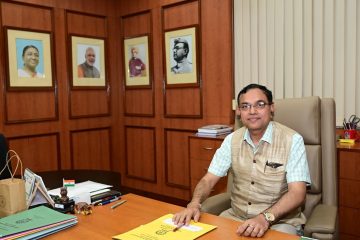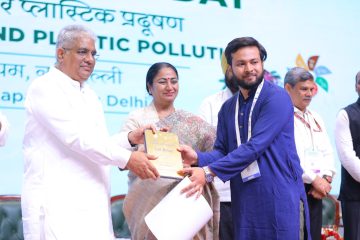 Three young boys, almost painfully conscious of addressing what they believed was a way more mature audience than what they probably had in mind. Yet they represented a wisdom that is perhaps as tall as a mountain. The three of them were from “The 1947 Partition Archive”, a globally important organisation. The Partition Archive, a non-profit organization born at Berkeley, with an office in Delhi, has been collecting, preserving and sharing first-hand accounts of the Partition since 2010. The three bright young scholars, who have worked for the organization and continue to work with it, were invited to IIT Kharagpur’s Department of Humanities and Social Sciences by Dr Somdatta Bhattacharya of the department for a workshop entitled “An Interaction with the Partition Archive” to convince students, and everyone willing to listen, about the necessity of recording the voices of all who have experienced the Partition. And to do that before it is too late.
Three young boys, almost painfully conscious of addressing what they believed was a way more mature audience than what they probably had in mind. Yet they represented a wisdom that is perhaps as tall as a mountain. The three of them were from “The 1947 Partition Archive”, a globally important organisation. The Partition Archive, a non-profit organization born at Berkeley, with an office in Delhi, has been collecting, preserving and sharing first-hand accounts of the Partition since 2010. The three bright young scholars, who have worked for the organization and continue to work with it, were invited to IIT Kharagpur’s Department of Humanities and Social Sciences by Dr Somdatta Bhattacharya of the department for a workshop entitled “An Interaction with the Partition Archive” to convince students, and everyone willing to listen, about the necessity of recording the voices of all who have experienced the Partition. And to do that before it is too late.
Questions arise as to why is such a recording necessary. And why the urgency?
For starters, oral history gives a fuller, and more accurate picture of the past. The official history of any event, particularly of Partition, not only views the times through the perspective of ‘national’ leaders and prevalent politics, it also overshadows the experiences of the people who lived through the times. Eyewitness accounts have been seen to fill the gaps in documented history, and sometimes even contradict the written record. They at times hold out an alternative perspective that is brushed aside by the dominant discourse that centres around the Hindu-Muslim violence. The everyday history that surfaces takes the focus away from the violence-rescue binaries, helps us understand change at the individual level and help preserve a moment in history that may be lost to posterity forever unless we hurry.
 IIT Kharagpur is keenly aware of the significance of oral history. In fact, it has its own oral history bank of Partition stories that has already seen an investment of more than two years of hard work. It is a work in progress and Prof. Anjali Gera Roy, the project’s initiator, sees her work as part of the worldwide initiative to record the stories of Partition. Concentrating on the “1.5 generation”, or the descendants who suffered the indirect impact of Partition, Dr Gera Roy’s project focuses on the social and psychological traumas experienced by the survivors of displacement, their feeling of “unhomeliness” caused by their uprooting from settled existence, their sense of loss of privilege and status, the loss of language and culture through the pressure to assimilate, and their relegation to an outsider status despite achieving economic success.
IIT Kharagpur is keenly aware of the significance of oral history. In fact, it has its own oral history bank of Partition stories that has already seen an investment of more than two years of hard work. It is a work in progress and Prof. Anjali Gera Roy, the project’s initiator, sees her work as part of the worldwide initiative to record the stories of Partition. Concentrating on the “1.5 generation”, or the descendants who suffered the indirect impact of Partition, Dr Gera Roy’s project focuses on the social and psychological traumas experienced by the survivors of displacement, their feeling of “unhomeliness” caused by their uprooting from settled existence, their sense of loss of privilege and status, the loss of language and culture through the pressure to assimilate, and their relegation to an outsider status despite achieving economic success.
In a way, Prof. Gera Roy’s work is part of a composite drive to see the heartbreak of Partition not merely through the communal violence of the time but also the problematic of home and homelessness and explore how the politically enforced displacements led to complex experiences of home and identity. Several have done it already, such as Urvashi Butalia, Vazira Zamindar, Devika Chawla and, of course, Guneeta Bhalla, whose brainchild “The 1947 Partition Archive” is. Each of the three gentleman – who came to IIT Kharagpur to introduce listeners to how the Archive is crowdsourcing the personal histories – too had experienced the many dimensions of this one momentous historical event while working as Citizen Historians.
Ritriban Chakraborty, who is pursuing his MPhil at Institute of Development Studies, Kolkata, and worked as a Citizen Historian for the Archive highlighted the cultural complexities that that Partition heightened. One particular aspect was the cultural divide between the ‘Bangal’ and the ‘Ghoti’ (he illustrated this with reference to Tapan Raychaudhuri’s recollections in his book, Bangalnama), and the sudden equating of the ‘Bangal’ with the refugee. The issue has given him insight for his doctoral work. His inquiry into Partition history also reiterated – through the story of an aged relative – how women’s bodies became the site where battles were lost and won, and also how the psychological scars endured during the time lay the ground for long-lasting perceptions. Even though subjective, Ritriban strongly recommended the use of the oral history methodology for the understanding of the past and the present.
Debraj Banerjee, former Citizen Historian and Story Scholar for the Archive, and now a Project Developer for the initiative, made this point clearer through the story of Shahzadi Begum, an Urdu speaking Muslim woman he had met at the Geneva camps in Dhaka. Her family had opted to migrate to East Pakistan, where, as Urdu-speakers, they fared fairly well. But the Bhasha Andolan and the Bangladesh Liberation War of 1971 changed everything. Urdu-speaking people came to be seen as traitors and found their way to ghettos like the Geneva camps. Political events beyond her controlled impacted her life for a third time when her children migrated to Pakistan during talks of an exchange of population between Bangladesh and Pakistan, and she remained stuck in Bangladesh when the talks were called off. “The ordeal or trauma of Partition is not necessarily bloody,” said Debraj.
There was, of course, plenty of blood and gore. Lokesh Chakma, the third speaker from the Partition Archive, a post-graduate from Visva-Bharati, and now a documentary film-maker and freelance writer, talked of the instance where he was asked to stop the recording by an interviewee since the telling was too painful. Lokesh played for the audience his video recording of the account of Chhabi Sinha, a resident of Dacca. As a young girl at the time of Partition, she had to be rolled up in a mat (sheetal pati) to stop her from screaming while witnessing slaughter after slaughter at her own home.
 Lokesh also played for the audience the account of Kakali Basu from Pabna. She talked of the way Durga Puja was celebrated during her childhood – how Muslim boatmen, who would compose special jhumur songs for the occasion and hold boat races, participated in the occasion alongside the Hindus. Lokesh has also recorded the story of a displaced Buddhist who, inspired by his new homeland, initiated a new genre of Buddhist-Baul songs and poetry.
Lokesh also played for the audience the account of Kakali Basu from Pabna. She talked of the way Durga Puja was celebrated during her childhood – how Muslim boatmen, who would compose special jhumur songs for the occasion and hold boat races, participated in the occasion alongside the Hindus. Lokesh has also recorded the story of a displaced Buddhist who, inspired by his new homeland, initiated a new genre of Buddhist-Baul songs and poetry.
The Partition stories, as the speakers insisted again and again, are not about enmity alone. They are also about tenacity, compassion and forbearance. In the polyphony of the oral stories, these are the alternative truths that surface.
The 1947 Partition Archive has several types of programs for those interested – Citizen Historians and Story Scholars. To become a Citizen Historian, which is a voluntary program, one needs to participate in an oral history workshop webinar online that is held two days a week in order to train in how to take interviews. There is also a paid fellowship program for Story Scholars of either three or six months duration in the course of which the applicant would be required to take a stipulated number of interviews. There is also the Oral History Student Internship (OHSI) program of six weeks. The organization is hoping to crowdsource 10,000 stories by the end of 2019. So far it has collected 7,500 oral stories from more than 400 towns and cities spread over 12 countries with the help of some 70 Story Scholars and 550 Citizen Historian volunteers. Those interested can visit www.1947partitionarchive.org.
Banner design: Suman Sutradhar



